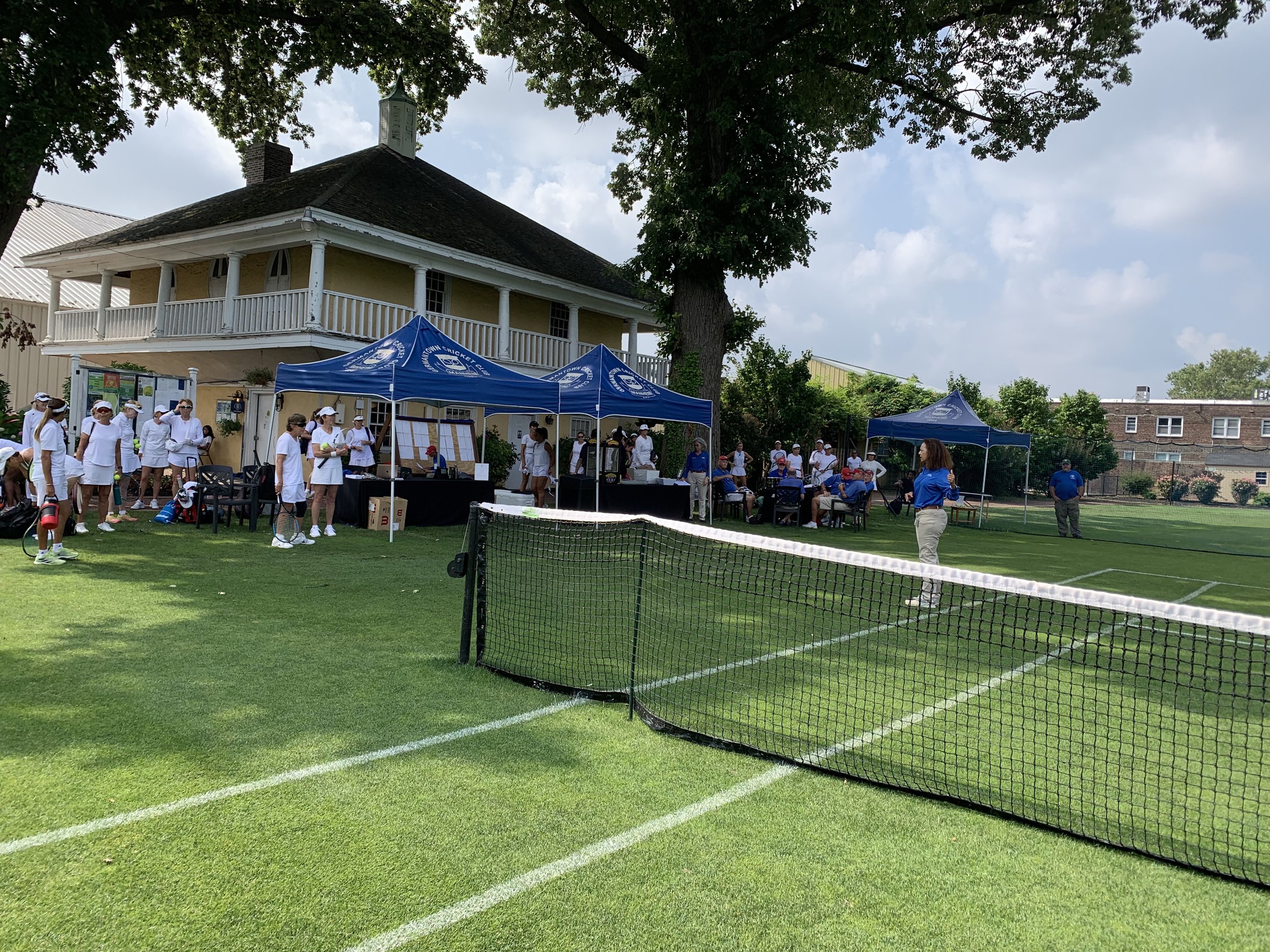Grass Court: Friend or Foe? How Best to Prepare for Battle
Mary Mayotte
With Level 1 Grass courts for the odd divisions taking place next month and the even age groups in September, it’s time for a refresher on grass play from this previously run article. If you’ve never played on grass, make this your year to step out!
July 15-21 National 35-85 Grass Court Championships Philadelphia, PA sign up here
Sep 23-30 National 40-90 Grass Court Championships Mission Hills, CA sign up here
My friend Lisa Tholen, a solid 5.0 player, curses the grass. Her game is feared on a hard court, but on grass, she fights every blade with massive force and determination. Grass tennis likens to the childhood parable about the sun vs. the wind. Which is more important here? Power or finesse? What makes the grass such a challenge? If you have the fortunate opportunity to play on grass–the Battle with a Twist-- here’s how to prepare.
The Grass Vista
The perspective of playing on grass is very different. Everything seems out of proportion. The court seems smaller and the lines imprecise. The net looks lower, and the bounces are unpredictable. The back fence is further away. Balls go all over the place. Just about everything can be annoying. Therefore, expect the unexpected. So, before playing on grass, at a minimum, walk the grounds and feel the velvety earth under your feet.
The Mind and Breath
It is essential to reshape your mental approach. Allow yourself to adapt your thought process from hard core intensity to a free-flow energy ferocity. It will help your movement, and movement is key. Practice deep breathing and use it to relax from point to point. The points will be much shorter; therefore, the stress elevates at rocket speed, and it becomes harder to control your emotions, which opens the door for self-destruction.
The Stretch
Given we all appreciate the significance of a delicate stretch prior to all athletic endeavors, please note, the stretch prior to grass court tennis is a MUST. Gentle restorative yoga is a fabulous means to accomplish full relaxation physically as well as mentally. In addition to the normally prescribed tennis stretches, lunges are very important. Inevitably, after the match you will feel aches and pains omnipresent. I recommend a shower or bath, or even better, a massage, immediately after.
Forward
The mantra is Always Forward. There are no exceptions!
To interpret: the intent is not to plant yourself on top of the net, but forward resolve is the name of the game. You must execute the serve, the return of serve, and each ground stroke with mind and body. On all serves, practice coming forward on each stroke. Play every practice point with resolution to follow the ball forward, ready for split step and volley.
The Serve and The Return of Serve
Is there a more important shot than the serve on the grass? Probably not. However, some might argue it is the return of serve. The serve sets you up, sets your partner up, empowers, and energizes. Practice your serve. Practice the placement of the serve. As with many grass court shots, power is not always our friend. In reality, the faster the serve, the faster the return, allowing the server less time to move into position for follow up. Buy time with accurate and thoughtful placement. The short wide slice serve creates a more predictable return and pushes the opponent off the court, producing a wide-open court for a simple put away–unreachable. Force the returner to play cat and mouse, occasionally slipping the serve down the T. Remember: the key is to move Always Forward.
The receiver can counteract this strategy by staying tight to the service line, preparing early, and trying to force the serve wide or long with court position and body language. Try to cut off angle with a drive down the line and occasionally a nasty slice drop shot.
In doubles, I’m a huge fan of a high deep lob return. I like the clarity of this game plan, realizing the goal is to capture the net. Of course, you must also practice the lob and incorporate it into daily fun tennis matches. Remember all lobs do NOT have to go down the line. Use variety. Going cross court is extremely effective. Don’t let your ego paralyze you from using such a powerful weapon, particularly if you are lucky enough to carry topspin in your bag of tricks.
The Volley
Last but certainly not least…the volley. The grass reacts beautifully to daily drilling which can be practiced on every service every day. Fifteen minutes a day make the volley woes go away… kind of like weight watchers, you see immediate results! Yes, use a timer! Easy drills volley to volley, implementing and covering all court angles: soft and gentle; drop ball; slice; super undercut slice; backhand forehand; north, south, east, west movement; no backswing; ready position; and racket preparation not only add consistency and confidence to your volley but also incorporate exhausting and necessary footwork exercises. Once you have worked diligently on your soft volley, know when to take the opportunity to crush the high short ball. Patience and awareness…practice the split step! The split step wakes your body up to engage the core and legs and prepare. Attack, penetrate, retrieve, prepare…look for an overhead! SMASH.
Game. Set. Match.
Mary Mayotte considers grass a friend. Just like a good friend, you love it and you curse it at the same time.


